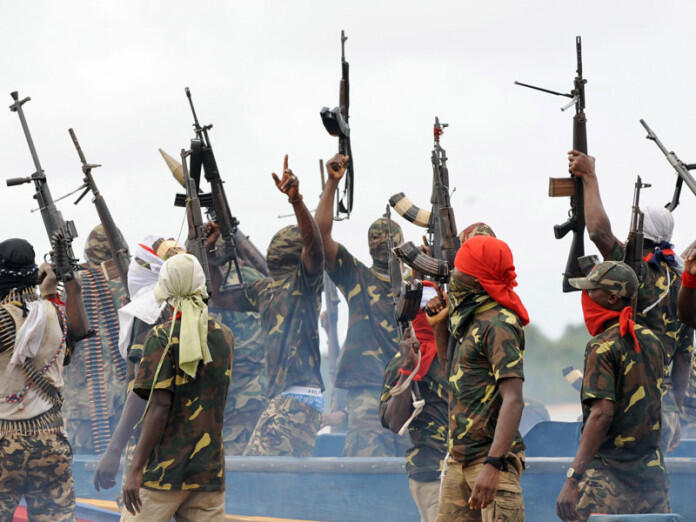The Niger Delta Avengers, a militant group that has claimed responsibility for attacks on oil and gas facilities in Nigeria’s southern energy hub, said on Tuesday it never agreed a ceasefire with the government.
Government officials told Reuters a one-month ceasefire had been agreed last week after talks between the oil minister, community groups and state governors in the Niger Delta, the source of most of Nigeria’s crude oil.
Militants say they want a greater share of Nigeria’s oil wealth to go to the impoverished Delta region. Crude sales make up about 70 percent of national income and the vast majority of that oil comes from the southern swampland.
A petroleum ministry official said the Avengers, who have claimed responsibility for most attacks in the last few weeks that have pushed Nigeria’s crude output to 30-year lows, were among those who agreed to a truce.
“It was very difficult getting the Niger Delta Avengers to the negotiating table, but we eventually did through a proxy channel and achieved the truce,” said the official, who asked not to be identified. A second government official also said a ceasefire was agreed.
But hours later the Avengers issued a statement on Twitter denying that it had an agreement with the government.
“The NDA High Command never remember having any agreement on ceasefire with the Nigeria government,” said the group.
It would be difficult to achieve a ceasefire in the hard to access swamps where militants are divided into small groups that tap widespread anger over poverty and oil spills. Leaders have little sway over unemployed youths willing to work for anyone who pays them.
RIGHT PEOPLE?
A Nigeria-based security expert, who did not want to be named, said he did not believe the government had been holding talks with the right people.
Earlier this month, the government said the military campaign in the Delta would be scaled down as part of an attempt to pursue talks with militants, who laid down arms in 2009 in exchange for cash benefits under a government amnesty scheme.
Nigeria, an OPEC member, was Africa’s top oil producer until the recent spate of attacks pushed it behind Angola. Oil production has fallen from 2.2 million barrels at the start of the year to around 1.6 million barrels. The impact has helped push up global oil prices.
Speaking after meeting President Muhammadu Buhari and Emmanuel Ibe Kachikwu, the oil minister, incoming OPEC Secretary-General Mohammed Barkindo said on Tuesday he had been told Nigeria’s oil production was “beginning to rise again”. He did not provide details.
Barkindo said the government was trying to resolve militancy in the Niger Delta through talks, but did not elaborate.
“Government is negotiating and we are seeing positive results. I remain confident that through this resolution a stable and permanent solution will be found,” he said.
Neither the presidency nor the petroleum ministry have issued official statements on a truce. Buhari has said the government wanted to hold talks with Niger Delta leaders to address poverty and oil pollution.
But his administration angered former militants when it cut by two-thirds the budget allocated for the amnesty program set up in 2009. Ex-militants were paid stipends and given employment training from that program.
A number of new militant groups have sprung up in the last few weeks, each with their own set of demands, which has made the insurgency increasingly fractured. It is not yet clear how many groups took part in the talks.
In a sign of apparent discord among groups in the Delta, former militants who were known as the Movement for the Emancipation of the Niger Delta (MEND) have criticized the Avengers and urged them to negotiate with the government.
In a statement on the Avengers’ website, dated June 18, the group said of the ex-militants: “If you and your criminals want to resurrect the defunct MEND and negotiate with the government that is your business”.
“We, once again, restate that we are not going to be part of any dialogue.”
Source: REUTERS











